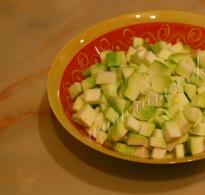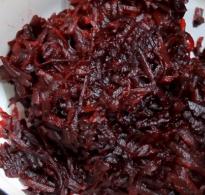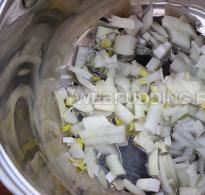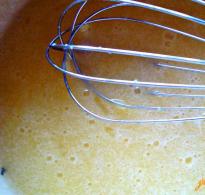Batch soups. How to make delicious soup from a bag
And once again about soups.
Today we’ll talk about packaged soups. How do you feel about them?
For example, when I met Dr. Dukan, I was surprised by his passion for soup cubes. Not just me. However...
Food concentrates appeared in the 18th century. It was then that the Kharkov scientist Karamzin invented an apparatus for drying products of plant and animal origin. So,
Soups from a bag are divided into three groups.
1. Instant - soup (from English. Instant – “instant”), just pour boiling water (for example, “Hot Mug” from “Maggi”, noodle soups “Rollton”, “Doshirak”).
2. “Quick” soup requires a pan of water and a few minutes of cooking (for example, “Bvstrosoup” from Gallina Blanca).

3. “Ready” soup just needs to be heated in the microwave or on the stove (for example, “Gourmania”, “Pride of the Housewife”).

The first option is extremely popular. But is it really that useful?
Let's discuss..
- Most quick soups, according to the promises of the labels, contain dried mushrooms, powdered tomatoes, shrimp or meat (also dried, with a taste reminiscent of soy).
- If among the ingredients there is a flavor identical to natural (mushroom, vegetable, chicken), there is a high probability of purchasing soup not with the taste, but only with the aroma of the specified product.
- In addition, there are very few biologically active substances in such soups, so fiber, vitamins and beneficial enzymes will have to be obtained from more familiar foods.
- Another component of bags and cups is the famous E-621, also known as monosodium glutamate. Such a contradictory seasoning. It is believed that it improves brain function and bears the proud name of “mind serum.” But it is also known that excessive consumption can lead to poor vision and other health problems. Both statements have their supporters among scientists. And while they are actively arguing, proving the validity of their opinion, and looking for the truth, it is better to abandon this spice. This means you will have to avoid “quick” soups (as well as bouillon cubes and seasoning mixtures) - the concentration of monosodium glutamate in them is very high. By the way, it is this that gives the instant soup an unpleasant aftertaste.
- Another popular ingredient is palm oil. Recent studies have shown that it worsens fat metabolism in the body and can cause the development of atherosclerosis.
- Quick soups always include salt, which is not spared. Eating from a bag, a person receives at least 15 g of this spice per day, while the norm for an adult is about 3 - 5 g.
- In addition, instant soups are generously seasoned with stabilizers, preservatives and other ingredients with the letter E - otherwise they simply could not be stored for such a long period of time (from a year to a year and a half). Abuse of instant soups can be harmful to health: such products are poorly digested and difficult to remove from the body . At best, this leads to heartburn. At worst, it negatively affects liver function, causes gastritis and weakens the immune system. Bouillon cubes and dry soups are contraindicated for hypertensive patients due to their high salt content, as well as for ulcer sufferers due to numerous food additives and flavor enhancers. So you should stay away from the shelf with “quick” dishes, except in emergency cases. Moreover, nutritionists categorically do not recommend eating instant soups more often than once every two weeks, and completely replacing lunch or dinner with them.
A few simple recipes will help reduce the harmfulness of soups made from concentrates.
- After pouring boiling water over the noodle soup, it is better not to add the included oil to it. Replace it with a teaspoon of regular vegetable. Some buyers even abandon the soup base altogether, replacing it with natural salt, pepper and fresh herbs that are on hand.
- You can add a little boiled potato to the instant soup - it will absorb excess salt.
- For quick soup that requires cooking, it is recommended to add less water than indicated on the package - the lunch will be thicker and more filling. The same potato can handle excess salt, just put it in a container raw at the beginning of cooking, and before serving, just take it out and throw it away.

The habit of starting lunch with a bowl of hot soup "from a bag" can lead to serious health problems, warns Dr. Rachel Thompson, an employee of the World Cancer Research Fund. According to her, soups from the “just add water” series (that is, a powder mixture that in a minute turns into borscht, cabbage soup, pea, chicken, beef or vegetable first course) cannot be called healthy food, since they are leaders among semi-finished products in terms of salt content : One serving contains up to half the daily value of sodium chloride.
Meanwhile, as a recently completed study by Japanese scientists showed, excess salt doubles the likelihood of developing stomach cancer. For 11 years, oncologists observed the lifestyle of 40 thousand residents of the Land of the Rising Sun, paying special attention to their gastronomic preferences and bad habits. According to the data obtained, among men who preferred salty foods, one person in 500 had an increased risk of developing cancer. This is twice the rate recorded among those who consume salt in minimal quantities. As for the fair half of humanity, the risk of disease among lovers of salty foods is four times less than among men. Note that stomach cancer is one of the most common forms of this dangerous disease. In terms of mortality rate - every year malignant tumors of this localization claim the lives of about 1 million people on the planet - it ranks second, second only to lung cancer.
By the way, the first semi-finished soup product appeared in America at the turn of the 19th and 20th centuries, when women went to work en masse. Then one of the employees of the Joseph Campbell Canning Company presented a truly revolutionary invention - dry soup concentrate. Busy housewives, soldiers and travelers really liked the new product. In the USSR, they also produced first courses in bags with the famous star pasta. Now, as before, dry soups are in great demand among Russians who do not have time for long snacks at work, as well as among those who often go hiking and travel on trains.
Comment
Semyon Rapoport, Doctor of Medical Sciences, Professor of the Moscow Medical Academy named after I.M. Sechenova, Deputy Chairman of the Association of Gastroenterologists of Russia, Honored Scientist of the Russian Federation:
You don’t have to be an expert to understand: the more chemicals in a product, the less healthy it is. If you look at the composition of powdered dishes, it is easy to see that they contain a minimum of natural ingredients, everything else is preservatives (they are used to increase shelf life), dyes, synthetic flavor and aroma enhancers, emulsifiers and other “improvers”. Therefore, of course, you should give preference to homemade soups, and eat soups “from a bag” occasionally.
As for the increased salt content, it still delivers the main blow not to the stomach, but to other organs and systems. Excess sodium chloride underlies a number of pathological processes. It is especially dangerous for people with kidney and cardiovascular diseases, in particular for hypertensive patients (salt is known to increase blood pressure). Daily salt intake should not exceed 5-6 grams (height teaspoon). Moreover, this includes not only the salt that we add when preparing food, but also that contained in finished products - bread, sausage, cheese, chips, mayonnaise, etc.
Most of us already know that powdered soups cannot bring anything good to our body. They are artificial, harmful and, it would seem, why remember them again.
However, what should all those office workers, and not only them, do, who have catastrophically insufficient time for a normal lunch, and have long forgotten about a home-cooked breakfast? Manufacturers continue to tempt people with less monosodium glutamate or salt. Is it possible to consume soups made from powder at least occasionally?
What's hidden in the soup?
Nowadays, it is difficult not to succumb to the temptation of fast food - we truly live on the go, we sleep little. And then these producers tempt you with lightning-fast preparation of “almost home-made food.” And we are already confused - on the one hand, we would like to eat healthy food, but on the other hand, it would be nice to just eat on time. Otherwise, only memories will remain from your figure and digestive system. And then there are financial difficulties.
When we think about soups made from bags, we usually think of two types of them – the actual powdered soups themselves and traditional “Chinese” soups with special noodles. These latter actually originate from Japan, where they were once considered a luxury food designed to combat hunger. Now everything is completely different.
Powdered soups, unfortunately, have nothing in common with home cooking and grandma's recipes. Manufacturers compete with each other, adding more and more new ingredients to these “dishes”. For example, this could be some dried vegetables or herbs.
And no one pays much attention to the fact that their content is, as a rule, insignificant compared to the components that you don’t want to brag about. Of course, as among other product groups, in this case we can find both the best and worst products with different amounts of artificial additives and flavor enhancers. What can we discover by reading the composition of popular soups?
1. Solid vegetable fat
Eating trans fats, particularly those found in such foods, is associated with the risk of coronary heart disease, cancer, and especially breast cancer. Efforts are being made around the world to reduce the amount of trans fat in processed foods. It is worth knowing that the same fats obtained from natural sources (beef, milk), in limited quantities, can have a beneficial effect on the body.
2. Salt and sugar
These are two components, the amount of which is overestimated in ready-made dishes. Excess salt in the diet increases the risk of hypertension, malignant tumors, and causes water retention in the body. Researchers who study the effects of salt on our bodies warn that one bag of soup contains more salt than a packet of chips. Sugar, on the other hand, increases the risk of obesity, tooth decay, diabetes and tumor development.
3. Nutritional supplements
If we talk about preservatives, we must honestly admit that manufacturers of premium soups are diligently trying to reduce their quantity to a minimum. High-quality dried, tightly packaged goods have a longer shelf life, even without the addition of preservatives.
A controversial component in powdered soups is monosodium glutamate (E621), a flavor enhancer. On the one hand, it is approved for use in food products in many countries, on the other, reports appear every now and then about its harmfulness (for example, an increased risk of developing obesity, allergies, bronchial asthma).
To produce soup powders, dyes and flavors are needed. During drying, vegetables lose both their color and flavor. The situation can be saved by using both artificial and natural ingredients. However, do not forget that this will adequately affect the cost of the product.
In most cases, the cheaper the product, the more artificial colors and flavors it contains. In order for dried components to retain their shape, manufacturers are forced to add an anti-caking component.
What is the harm of powdered soups?
As a result, all these artificial additives significantly reduce the digestibility of the dish. The body must work much harder to digest such a complex product. The noodles from the so-called “Chinese soups” turned out to be quite a difficult dish for our digestion. One of the intermediate stages of its preparation is rapid frying at a temperature of 200°C.
This significantly reduces the digestibility of such a product. By the way, the entire line of dyes, flavor enhancers and other technical additives has a bad effect on our skin. One of the mechanisms for releasing toxins is an increase in sebum secretion, and this aggravates the health problems of the skin itself.
The “convenient food” market, that is, “convenient food,” is gaining strength every year. We are getting busier and busier, we have less and less time, and if we manage to find even an hour of free time, suddenly there are 100 most interesting things that we want to do instead of sitting in the kitchen.
Despite this, do not forget about health. Of course, nothing bad will probably happen if we eat soup made from powder several times a year, for example, when visiting or on the road. It is important that this does not become our habit. The temptation of convenience and time savings should not be greater than the concern for health and well-being.






